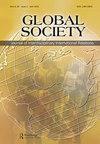逆向话语与激进话语:对巴特勒和福柯的一次合格批判
IF 2.3
Q2 INTERNATIONAL RELATIONS
引用次数: 3
摘要
本文探讨了福柯和巴特勒提出的反向话语的概念。有人认为,巴特勒的主体形成概念过于确定主义,福柯的话语也是如此。根据斯科特的批评,有人认为主流意识形态的概念化有强有弱。话语是对权威的竞争,主导意识形态是更强大的决策者的话语,而次要意识形态则持续存在。这导致了一个更具互动性的结构约束理论和激进行动的可能性条件。社会行动者可以通过再现主导话语来改变权力关系,同时逆转隐含的权力-权威关系——反向话语。或者,更激进的是,他们可以通过试图围绕次级意识形态建立共识来抵制主导意识形态,而次级意识形态与主导意识形态是不可通约的。逆向话语比激进批评的优势在于它再现了事物的自然秩序。然而,它有复制具体化规范的缺点。本文章由计算机程序翻译,如有差异,请以英文原文为准。
Reverse Versus Radical Discourse: A Qualified Critique of Butler and Foucault, with an Alternative Interactive Theorisation
ABSTRACT This article explores the concept of reverse discourse, as suggested by Foucault and Butler. It is argued that Butler's concept of subject formation is overly determinist, as is Foucault's of discourse. Following Scott's critique, it is argued that there is a strong and a weak conceptualisation of dominant ideology. Discourses are in competition for authority, where dominant ideology is the discourse of more powerful decision-makers, while subaltern ideologies persist. This leads to a more interactive theory of structural constraint and the conditions of possibility for radical action. Social actors can change power relations by reproducing dominant discourses while reversing implied power-authority relations – reverse discourse. Alternatively, more radically, they can resist dominant ideology by attempting to build consensus around subaltern ideology, which is incommensurable with dominant ideology. Reverse discourse has the advantage over radical critique in that it reproduces the natural-order-of-things. However, it has the disadvantage of reproducing reifying norms.
求助全文
通过发布文献求助,成功后即可免费获取论文全文。
去求助
来源期刊

Global Society
INTERNATIONAL RELATIONS-
CiteScore
3.10
自引率
6.20%
发文量
32
期刊介绍:
Global Society covers the new agenda in global and international relations and encourages innovative approaches to the study of global and international issues from a range of disciplines. It promotes the analysis of transactions at multiple levels, and in particular, the way in which these transactions blur the distinction between the sub-national, national, transnational, international and global levels. An ever integrating global society raises a number of issues for global and international relations which do not fit comfortably within established "Paradigms" Among these are the international and global consequences of nationalism and struggles for identity, migration, racism, religious fundamentalism, terrorism and criminal activities.
 求助内容:
求助内容: 应助结果提醒方式:
应助结果提醒方式:


